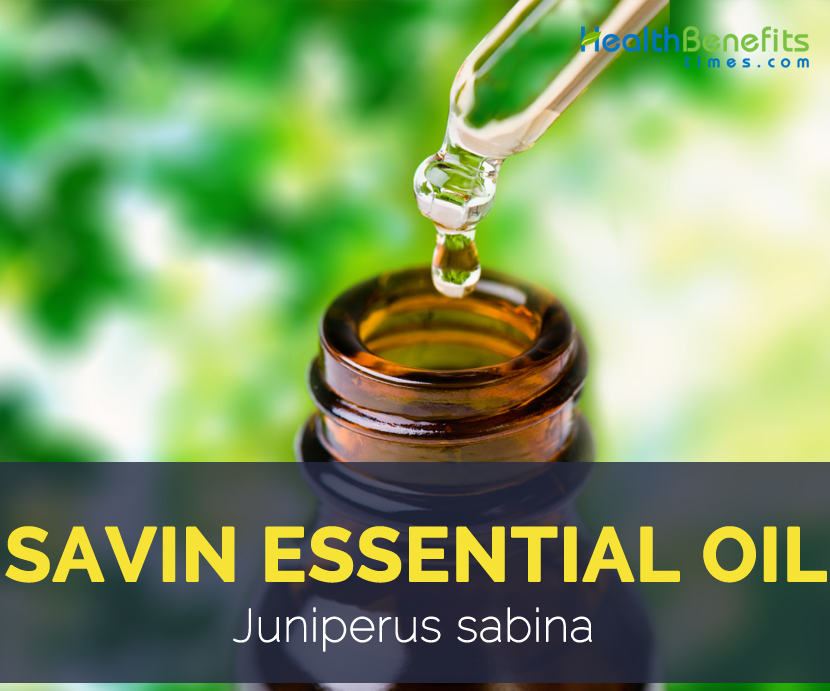| Savin essential oil Quick Facts |
| Name: |
Savin essential oil |
| Scientific Name: |
Juniperus sabina |
| Origin |
North America, the middle and southern Europe. |
| Colors |
Colorless to pale yellow |
Savin Oil is obtained by steam distillation of twigs and leaves of savin scientifically known as Juniperus Sabina, Linn. (N.O. Coniferae), indigenous to the mountains of Southern Europe and are frequently cultivated in Britain. It is official in the U.S.P. savin oil occurs as a colorless or yellowish liquid, having a peculiar, unpleasant, narcotic odor, and a bitter, pungent, camphoraceous taste.
Savin is a compact evergreen shrub about 1 meter (3 feet) high which tends to spread horizontally and has pale green bark, small dark green leaves and purplish-black berries containing three seeds. It is a native to North America, the middle and southern Europe.
Savin was once used in an ointment or dressing for blisters, for syphilitic warts and other skin problems, but is an irritant when used internally or locally. It is a powerful emmenagogue, and serious and fatal cases of poisoning have resulted when attempted to use as an abortifacient.
Savin oil is considered too poisonous to use as it contains podophyllotoxin that destroys cells and has resulted in fatalities. The oil is banned from sale to the public in many countries due to its toxic effects.
Traditional Medicinal uses and benefits
- The essential oil will stimulate the womb to functional activity when it is passively congested and sluggish.
- When given in small well diluted doses as a tincture it helps in relieving rheumatic pains and swellings connected with impaired health of the womb.
- Savin oil is a powerful irritant, both externally and internally.
- Savin was once used in an ointment or dressing for blisters, for syphilitic warts and other skin problems.
Other Facts
- The oil is banned from sale to the public in many countries due to its toxic effects.
Precautions
- Savin oil should not be used in aromatherapy as it is toxic.
- It may cause hematuria and violent gastrointestinal irritation when administered internally.
- Fatal poisoning has resulted from its use as an abortifacient.
- It is considered too poisonous to use as it contains podophyllotoxin that destroys cells and has resulted in fatalities.
Savin Essential Oil Facts
Savin Oil is obtained by steam distillation of twigs and leaves of savin plant. Savin oil is considered too poisonous to use as it contains podophyllotoxin that destroys cells and has resulted in fatalities. The oil is banned from sale to the public in many countries due to its toxic effects.
| Name |
Savin essential oil |
| Scientific Name |
Juniperus sabina |
| Native |
North America, the middle and southern Europe. |
| Common Names of Plant |
Savin, the Juniper Savin (Sabina), or Saffern, Devil’s Tree, Magician’s Cypress |
| Plant Growth Habit |
Small evergreen plant |
| Plant Size |
1 meter (3 feet) high |
| Bark |
Pale green bark |
| Leaf |
Small dark green leaves |
| Fruit |
Purplish-black berries containing three seeds. |
| Oil Consistency |
Clear liquid |
| Oil Color |
Colorless to pale yellow |
| Flavor/Aroma |
Unpleasant |
| Taste |
Bitter and repulsive. |
| Plant Parts Used |
Twigs and leaves |
| Methods of Extraction |
Steam distillation |
References:
http://essentialoils.co.za/essential-oils/savin.htm
http://www.gardenherbs.org/simples/savin.htm
http://www.henriettes-herb.com/eclectic/bpc1911/juniperus-sabi_oleu.html
Comments
comments


